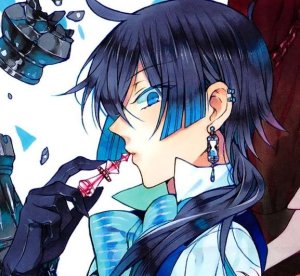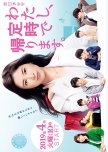
It’s one of those dramas that have the structure in which a lead has a specific standpoint in life so, in every episode, they get to influence positively a member of the cast in escalating difficulty to deal with; like Mother Game, Kirawareru Yuuki, etc.
In this case, the setting is a company workplace, specifically of web design and maintenance, and as you can probably guess there’s room for a lot of comparisons between how people used to work and how people work nowadays. There are about 3 or 4 generations of employees depicted in the drama, and the differences between work ethics are interesting to watch.
Thankfully, this is not like HOPE, where the aim was to wax poetic about an older working practice, here every perspective is explored and ultimately the drama focuses on people’s wellbeing and the exploration of why Japanese society is so work-focused, to the detriment of people’s health at times.
The cast of characters is interesting, although there wasn’t enough room in the drama for all of them to be as showcased as they could have been. Normally, in these types of dramas there isn’t a romantic aspect underlying and if there is, it’s very minor, so that the plot can focus on the characters and their development. This one, though, has a sort of love triangle happening, which isn’t developed enough to consider it the main element of the drama, but it isn’t minor enough to not take a part of the plot.
The handle of that "romantic" aspect, if we can call it that, wasn't the best. Some decisions seemed to come out of nowhere and some plot devices used to further it along seemed rushed, which may have to do with the inability to adapt everything from the source material in 10 episodes. I don’t really care much about romance, so it isn’t a problem for me, but I felt that some decisions regarding the male characters and their actions lacked background information and seemed underdeveloped, in a narrative sense.
Yuriko Yoshitaka does a very good job as the lead, in a role that could have really influenced the whole thing negatively had the actress not been good or had they chosen someone who has a type-cast and would influence the audience’s perception easily. She really carries through the energy of the drama and works very well with her whole cast.
My favorite scene, acting wise, goes to Dori Sakurada, Yuuki Izumizawa and Yuriko Yoshitaka , their scene disclosing Shu’s past and Kurusu’s present was my favorite in the drama.
Overall, this one was good. It touches on heavy subjects at times, but never loses its hopeful spirit and does leave you with a good message and the idea that working expectations are changing and should be revised. That things regarding work don’t just have to do with obligation and money, but with an overlying cultural education and social construct around it, which applies differently to everyone.
Was this review helpful to you?
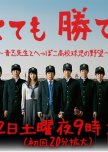
The drama has the main tropes of a sports high school drama: one team initially divided, one teacher who is there to change their fates, a girl coach with an attitude, a reporter, bonding and lots of failing.
But not all of it is exactly as it seems. The team is actually bad, really bad and, from day one, they recognize they suck. They won't try to change miraculously overnight, they won't try to out-power their more qualified competitors, they will do what they can with what they have. It's pretty much a Dragon Zakura take on sports, if you will. Which, honestly, is a welcome change in my opinion.
The teacher, who seems to be there to change their fates and lives (played by Nino), is actually kind of really done with everything. All the time. And not in a "I pretend I don't care but I'll stay up late cleaning" kind of done, he seems to genuinely not care. Which, of course, has deep roots in memories and a background story to be resolved, but it pays off because, when you get to see emotional Nino, you feel the intensity much more clearly.
In dramas like this, with so many cliches, what really makes them stand out to me are the characters and their growth. I have to say I was invested with almost all of them (with the exception of a love triangle I really didn't care about enough at all). My special mentions go to Kanata Hongo, Shotaro Mamiya and Kento Yamazaki (those last two have some really interesting story and development together I was very interested in).
All in all, yes, it's filled with cliches, but most of them have their own spin, and it's worth a try. Most of all, my favorite thing about it is that it's unapologetically honest and raw at times. There's a certain scene which is very emotional, for example, and it has absolutely no background music at all, which I thought was a great move to make it even more intense. If you like sports dramas but want something a bit different and don't mind the drama, try this one.
Was this review helpful to you?
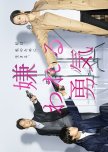
What this drama does is use the book as a sort of backbone to create the character of Ando Ranko (a great performance by Karina), a female detective with a complicated past and a life mission, whose way of living exemplifies, in a very extreme way, the lessons from the book. The conversations, which take place between Shige's character, Ooyama Toshio, and Shiina Kippei's character, Daimonji Tetsuto, frame this main character and provide more context to her actions. Which, while I was watching the show, I felt ok, but looking back and knowing the book's setting, makes me feel pleasantly surprised, because it isn't quite the same to preach this "act according to your own desires and not other people's and have the courage to be hated" to men, in Japanese culture at that, than to see it performed by a woman. I definitely need to give the drama kudos for that choice, especially casting Karina for it. My re-watch value went up when I understood the complexity and courage of this decision, and it got me interested to read the book and see it with the full context, which I'll surely do. The choice to use these two men as a frame and to embody the philosophy of the book on a female lead, a female lead who happens to be an unmarried 32-year-old woman who's stellar in a job mostly done by men in Japanese society deserves my attention.
The detective drama aspect of it, however, doesn't stray too far from what's been seen in jdramas very frequently: main detective is cold, calculating and incredibly smart, with an unparalleled instinct to solve mysteries; the sidekick is kind, emphatic, loyal and wears his heart on his sleeve, they complement each other in their partnership though it takes time for them to understand each other. You've seen it before, I've seen it before, there's no much going on there for originality. There's also the same theme of singular cases which have an underlying bigger case that relates to the protagonist in a personal level, which you've also seen before.
The cast of characters, though, is a delight to see, Sakurada Dori and Itsuki Sagara do a very good job especially; and all cases relate to elements from Adler's psychology which were a bit hard to follow at times for a non-Japanese speaker like myself, but it always explored interesting topics of self-knowledge and life in society that was interesting for a detective drama to have, especially when it was portrayed through female characters (and there are a lot of good ones in this).
If you're looking for a detective drama for the thrill, the mystery, the twists and turns, this one doesn't particularly stand out in comparison to others, it isn't the worst but it isn't the best. However, if psychology is your thing, if you like dramas that make you think and you're fond of strong female leads who are unapologetic about being great at what they do, this is a good one of those.
Now, if you'll excuse me, I have a book to find and a NEWS song to hear on repeat.
Was this review helpful to you?

Was this review helpful to you?
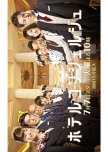
You're not gonna get a whole lot of world-building here, you're not going to find star-crossed lovers or dreadful villains, but you'll find a lot of genuine characters and over-all good people trying to make others happy by providing the best work they can in a great hotel. Like there usually is in dramas of the kind, there's people with different perspectives of what's best for clients, there's personal issues getting involved in their jobs, there's clients that transcend the limits of what the crew can do, including, but not limited to: stalkers, overbearing parents, interns with severe social anxiety, kids trying to make their parents or grandparents happy, husbands being toxic and various other situations, always centered in human emotion and social links.
A great surprise and something I'd like to point out is that there's a character, played by Asari Yosuke, who uses sign language to communicate and him and Mariya's character use it back and forth pretty smoothly. This is something I rarely see in dramas, sadly (I hope one day we get a good live action drama of the Koe no Katachi manga, for example, because it's amazing), and I found it great that they not only did it in a recurring character, rather than a guest, but that it was also explored in an episode somewhat, when his uncle shows up.
Maybe, in comparison to other shows with the same theme, it's not the most original or well-written, some situations tend to go a bit in circles and there is, I believe, a bit of a lack of development for the lead character, because, even though I get what her importance is in the plot, I feel she doesn't get a very clear resolution in order for her development to be consistent throughout. It's not as strong as other job-centered shows, but it's not bad and it's well performed. I particularly enjoyed Watanabe Natsuna a lot in this.
So, long story short, if you want to see a drama that's relatively calm, heartwarming and not too much of a stress, but which does focus on human interaction and has some deep emotional scenes, this is a good one for you. It's probably not gonna keep you on the edge of your seat, but sometimes I'm not looking for that in a drama. Sometimes I just want nice people trying their best.
Was this review helpful to you?

This is one of the most bizarre cinematic experiences I had this year. For all intents and purposes, it should have been absolutely my cup of tea. It has several elements that I'm into, including a property I really like, otaku subculture references, musical theater references and Saito Takumi singing and dancing which, as someone who saw the guy first in tenimyu, I appreciate.
But man, this did not work.
They pretty much took the source material for about 20% of its plot and then went in strange directions that hindered not only the possibilities of the movie as an adaptation but also the movie in itself as an experience. Because this movie goes nowhere. You could say there is a development of the main relationship if you squint but that would be generous, especially if you have any frame of reference from the manga or the anime as a comparison.
What is frustrating to me is that the cast was pretty well picked, for the most part, especially Takahata Mitsuki did a really good job. But I have honestly no idea what Fukuda Yuichi was thinking when he adapted this and why he thought Wotakoi was a good basis to built this bizarre musical experience.
There is a dissonance between the source material and why it works and the way in which movie musicals (and musical theater) is built.
Wotakoi is a comedy with a very dynamic pace, it uses multiple characters with different personalities who represent different fandom experiences to create their comedic energy. It's built around references and jokes that tie with gaming, anime, manga, cosplay and many other things, but it's also built in the clumsy yet heartfelt interactions of characters who have a lot of trouble navigating social situations and stumble over each other in a fun yet sincere way.
Musical theater uses songs to move along the plot and to delve into character motivations, feelings and relationships. Songs are used to set the story, they are necessary for us to understand the characters and their environment. We need Jean Valjean to have a soliloquy to make us understand the moment of emotional turmoil that sends him into making a decision about his life, for example.
That ruins the dynamic of Wotakoi. Their interactions and their pacing which plays off of each other and moves the plot while also providing a rhythm and a narrative identity is interrupted and put to sleep by these musical moments. Especially when you have characters like Hirotaka singing about his feelings, which is something much better shown in his attempts at figuring out his relationship with Narumi than told in a weird number while she's drawing. Or Narumi's entire dichotomy of trying to hide that she is an otaku and blending in with the normies, which feels a lot less relatable as a musical number in Shibuya with some idol outfits.
And if you are here for Hanako and Kabakura I was too and I'm so sorry to say you're gonna have to scrape to the bottom of the film to get something.
The movie wasn't an entire waste of my time, but it could have been so much better if who made it was actually interested in making a live action adaptation of Wotakoi instead of bending it with whatever musical idea they had and shoehorn it there for some reason. With this cast and this production value, the live action could have been really great. And, honestly, with some of these songs and performers, an entirely different movie musical could have also been really great.
But both together in the same thing? Nope.
Was this review helpful to you?
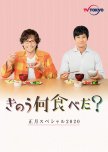
This special has all the feel-good energy of the drama, which I consider as heartwarming as the meals they prepare in it. If you liked the food, the feels and the domestic fluff of the series, this has all of it.
Storytelling-wise, it doesn’t add anything too crucial (aside from Miyazawa Rie making an appearance as the famous Mitsuya Mami), but it does develop interesting elements upon what the show discussed. There’s more about Shiro’s feelings towards his relationship with Kenji, about their plans of growing old together, and details about his relationship with his mom, past and present. This drama has never shied away from difficult subjects while remaining positive, and the special is no exception. A specific scene with Shiro’s mother got me feeling all sorts of emotions.
The special is divided into three mini arcs, the first and last centered in Shiro and Kenji, whereas the middle one is centered in Kohinata and Wataru, which I could have lived without, but I think it’s amenable enough, all things considered.
All in all, it’s an extension of the series that delves into some of the aspects outlined there but doesn’t add anything too major. Still, this is such a feel-good series, I come back to it when I need some pick-me up energy, and this is a good way to come back. The food is still amazing, by the way.
Apparently, there will be a movie, so maybe this special was meant to tie the two. In any case, it’s as enjoyable as the series, so if you liked it, I’d give the special a go.
Was this review helpful to you?
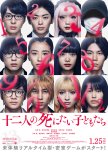
[I should warn, there's discussion on suicide in the following review, which might be obvious given the movie, but still]
A good portion of the negative comments I'm seeing are about the fact that they were expecting something else. That's fair, it's a fair thing to add in a review or a comment, that the marketing of the movie was misleading, but I personally don't think it's the movie's fault and I consider that a bad review that is based on expectations rather than the actual movie may give a less than fair perspective to those who are interested in it. But maybe that's just me.
There are a lot of Japanese movies and dramas that deal with teenage suicide, I feel like every generation has one. Which is understandable, and even crucial, concerning the social and cultural impact that the reality of these circumstances imply. However, not all stories talk about suicide honestly, not all of them delve in what it actually means. This movie does.
I might be in the minority here, but when a plot concerns 12 teens who want to end their lives, I'm hoping there's going to be some talk about the actual characters and backstories, some depth on the reasons and the perspectives, and most of all, some empathy. It's not a murder mystery dinner party, it's an event that concerns teens taking their lives. So yes, maybe there's mystery and suspense and the plot begins with questions to be asked, but that's secondary to the actual theme threading these characters together: the fact that they all want to die.
The movie doesn't center itself on the mystery, it uses the mystery to give these characters (or some of them) the excuse to stall. To talk. To ask questions. To get to know each other. And that is a brilliant, extremely realistic method to introduce, because thinking about the future as a whole is daunting, but thinking about the next question, the next doubt, the next step, is more approachable. It actually borrows something from therapeutic methodology and transforms it into a storytelling device.
The mystery and the suspense are methods to develop the character storytelling, to set the stage and to offer the opportunity for us to know these people, know their stories and see them develop their thoughts on each other and themselves. I'd say maybe the negative is that, being a movie, there isn't a lot of room for everything, and the mystery part does take some time, in order to drive the characters to where they might end. Still, in the time-frame of a movie, I feel the balance was well done and the result is a movie that leaves you hopeful but not in a bland, unrealistic way.
My advice is: don't come into this movie expecting a murder mystery, a gore slashfest or a high school drama dynamic. I'd say this movie is a combination of Suicide Club and The Breakfast Club, to put it in a very bizarre yet understandable way. Come into this movie expecting 12 teens, 12 very different teens, confronting the idea of suicide.
Was this review helpful to you?

Let's start by saying that I love Naomi Watanabe. A recurring problem I have with her dramas is that she's either most often pushed to the side as a supporting character/comic relief or, when she's lead, they tend to not let her shine in what she does best. For example, Five Star Tourist was a really good drama that I enjoyed a lot but they hid her behind a pretty bad wig, dull clothes and a personality that didn't let her do the most she could do. This drama lets her be 100% unapologetically herself: Kanna is funny, outspoken, stylish, everything we all love about her. And the plot doesn't revolve around her being plus size, another very recurrent issue in dramas that star plus size leads. She's also playing a fashion designer, on top of that, which is fantastic, considering she has her own clothing line in real life. So far so good.
Another great thing about the drama is that Kanna's relationships with female characters are very complex and interesting. Even the ladies that start being seen as "rivals" end up developing in something less archetypal and more human, which allows for her character to develop as well with these relationships. To be honest, some of these ladies (at least 3 that I counted) end up having more developed relationships with her than the male characters they pair her up with.
Now, if that would have been the drama (which is what the plot up there makes it out to be), if it had been all about Kanna facing life as a divorced mother with a dream to fulfill and bills to pay and facing the world through friendships and heartbreaks one day at a time, that would have been great. But enter the entire plot of Kaname Jun's character, Kanna's cheating husband, Rei (and his god awful parents).
My main issue with Rei's character, believe it or not, isn't that he's a terrible person (you need to read the plot or watch just episode 1 to see that). My problem is that they attempt, throughout the series, to give him a redemption arc, without actually focusing on him understanding his mistakes but just saying that he does and trying to fix them with money and things. It is possible to have redemption arcs with these kinds of characters without compromising the agency of the female lead or the aim of the story. A good example of this is Mondai No Aru Restaurant or even Mother Game, where the reason why the jerk guy faces his mistakes is because he finally understands empathy and sees what he's putting the female character through, but that does not immediately grant them forgiveness (Mondai No Aru Restaurant handled it amazingly well with Higashide Masahiro's character). Rei's arc is about karma punishing him, more so than empathy, so the audience would feel sorry enough for his poor soul to forgive him out of sheer pity rather than having him actually show his understanding of what he's done, besides trying to fix it with material things and empty words.
From any other drama, I would have probably let it pass with an epic eye-roll and a huge sigh. If this was yet another Ishihara Satomi/Kiritani Mirei josei drama of the last few years, I would have expected that sort of thing. But this was Naomi Watanabe kicking butt, being a strong female lead, inspiring me to keep going, and it deserved better than weak male leads raining on the plot's parade. And I'm not even gonna talk much about the character of Rei's mother, but picture the worst mother in law you've seen in a josei adaptation and multiply her annoyance times 10.
The acting is pretty good in this drama, it's very well directed, the clothes Naomi wears are fantastic (the ones she designs, I'm not so sure), it has emotional moments and funny moments, strong friendships and cool female characters, it's overall enjoyable. It just could have been so much more of that without wasting its time in an arc that went against the idea of the story.
I'll keep waiting for the drama that 100% is what Naomi Watanabe deserves as a lead.
Was this review helpful to you?

What really served the first season was that the plot, which was not too original (it's been done millions of times before), was interesting because the characters were good. They were likeable and relateable and you wanted to root for them. You wanted to see SHARK succeed and claim the respect they deserved. I could honestly not care less about this season 2 band.
It isn't just the acting, which yes, is lacking, but it's how they're written too. Everything is a cliche and a cardbord cut-out of the genre. They not only spend 12 episodes arguing about the same thing over and over (do we use original songs or do we settle with what the agency wants?) but there's a painful love triangle that you have to go through in between (bless SHARK 1 for not using that) and the lead character, played by Shige (I'm not even gonna comment on the crying), is uncapable of both making a good decision and accpeting when he made a mistake. I'm supposed to root for this guy? Plus, some of the characters who remain from season one seem like they don't even want to be there (Ichika was 1/3 of the character she was in season one and her growth seems to mean little to nothing with this season).
There's 3 silver linings in this drama. The first one is Genki. If this whole season would have been about Genki's character and his band instead of Cloud5 (or at least, at the very least, the story was balanced between them both), this would have been a lot better. I was rooting for his band much more than I was rooting for Cloud5 and when Yasu interacted with Genki, especially in that final scene, his character was much more interesting to me than with Shige's character and Kaede's character. The 2nd one is IVAN. I love IVAN. I love what IVAN stands for and the character of Samantha and the acting. I want to see IVAN in more stuff. The 3rd one is that SHARK shows up complete in one episode. And there's a hint for a continuation on SHARK's story, but I don't wanna get my hopes up, not after this.
All in all, I miss SHARK.
Was this review helpful to you?

I always thought, from afar, that GTO and this one were the classics in the whole "unlikely teacher taking care of a complicated group of students" trope in dramas, and I can appreciate, while watching it 13 years later (wow) that a lot of today's dramas owe to Gokusen.
The story is entretaining and can, at times, be as cheesy as you'd imagine, but it has heart and it's well portrayed. It was very good (and kind of adorable) to see baby Matsujun, Oguri Shun, Matsuyama Kenichi, Narimiya Hiroki and others of their generation and realize how much they've grown as actors. But the soul of the drama is definitely Nakama Yukie and her performance as Yankumi. I loved her character and the way she was portrayed, more than I liked many other teachers in other dramas with the same trope.
That being said, you need to know that there's going to be clichés, there's going to be cheesy scenes and there's going to be conflicts of one episode that get resolved in the same episode, as opposed to a cointinuing storyline; so if all that's not your cup of tea, this may not be the drama for you. But if you like school dramas with a problematic group of students and an unlikely teacher (in this case, a Yakuza heir with a very fun personality), then you need to watch this one.
Was this review helpful to you?
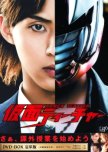
The first thing that you need to know is that there's plenty of action in this, I'd say it's a cross between a tokusatsu and a school drama, going more towards the "drama" side but keeping the action strong. So, if tokusatsus are definitely not your thing, I don't think I'd recommend it for you. If you don't mind the action, read on.
The school drama plot is basically the same you've seen a thousand times: school of delinquents, worst class of all, teacher comes in with goodness in his heart to change the hearts of the students and show them the path of light. The twist is that this teacher is secretly a masked vigilante who has government authority to inflict unrestricted violence on students as he deems necessary. Yes, you read that right.
Araki Gota, performed by Fujigaya Taisuke, is a sort of Kenshin Himura-ish character, who is trying to change his methods and use actual education (!) and understanding to get to the bottom of his student's problems and let them change by themselves and not through violence and fear. The whole dynamic between violence and understanding is the heart of the drama, and it's well represented. I didn't expect a drama with a masked guy on a motorcycle punching people to have such deep and turbulent emotional developments, but it does.
Still, the episodes are too short to dig as deep in the characters as I would have liked. There's an individual exploration of the characters to some extent, but there's not enough time for us to get as involved in the story lines as I feel the story had the potential to show.
But, if you like school dramas of teachers who change students' hearts, action sequences in every episode, Saito Takumi in a suit staring at folders and Fujigaya Taisuke wearing leather and giving heartwarming speeches, watch this. All jokes aside, it's pretty entertaining and unexpectedly emotional at times.
Oh, and you'd probably end up loving Tsukada Ryoichi's segments, even if initially you don't know what they're even for.
Was this review helpful to you?
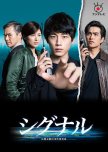
Signal: Choki Mikaiketsu Jiken Sosahan
4 people found this review helpful
If you're into Erased/Boku dake ga Inai Machi (manga, anime, movie or drama), this one is right up your alley. It has the same elements of detective/mystery storyline, a time travel element and the very first case of this drama is similar to the main one in Erased. This story, though, is less focused on one specific character and has various ones whose choices and lives impact the main arc, so it's more fast paced and has more puzzle pieces to gather. I appreciated that a lot.
The cases depicted in the drama are influenced often by real ones, and most of them are very graphic in terms of what they depict, so keep that in mind if you're impressionable. Still, I think they're handled pretty well and showcase the complexity of each one while making them fit on the overall story.
The time travel aspect is done via communication of the two leads, and stories of this kind tend to be tricky because of how they handle paradoxes and whatnot. I think this one uses the trope very well, it connects well throughout and keeps you on the edge of your seat, wondering what will happen next.
As a detective drama, it isn't primarily focused on who is or isn't guilty but on how law and justice don't always go hand in hand. This isn't an ideal portrayal where policemen are always good or where the justice system never fails, it's a story about shades of grey and how what's right isn't always what's fair. Considering the subject matter and the cases portrayed, the focus of the show was impeccable in that sense, and taking into account that there are TONS of detective/police jdramas out there, this perspective is much appreciated.
As it normally happens with jdramas, this version is shorter than its kdrama counterpart. Still, I think the length of this is perfect as it is, it would have dragged too much for my liking in a longer format. There seems to be a Special Episode that apparently is linked to this drama though, I haven't found info on it, so I'm gonna assume it's a side story which doesn't add to the main one in any determining factor, but who knows.
All in all, I highly recommend this drama to those who are fans of the thriller genre, like detective stories that aren't always black and white, enjoy time travel elements and want a story to keep them hooked.
Was this review helpful to you?

The plot is basically centered on Misako Renbutsu's character, Michiko, who is in her 20s, works in a business company as a part-timer and doesn't really know where her life is going. Her boyfriend treats her poorly, her job is on the verge of disappearing and in comes Naho Toda's character, Akko-san, to change her life. Through food. Lots and lots of food (seriously, don't watch this when you're hungry). The story goes from that starting point to a lot of different places and Michiko meets a lot of different people whose realities and lives inspire her to change her own. It's a story about finding your worth and growing through empathy. With food and children lit, which for me is a plus.
The problem for me was that the story has quite a few fast forwards and tries to cover more time spans than they actually have to develop them. For a drama with 8 episodes and 30 minutes per episode, it doesn't manage the time the best it could. On the one hand, you could say Akko-san's inconsistent contexts have a lot to do with her personality, but on the other, it can get a bit confusing.
There's consistent development throughout (mostly of Michiko) but there isn't a clear start to finish path, which may turn some people off if they're expecting a grand finale with fanfares and passionate kisses. If you're expecting chills and thrills and a lot of tension, this is not your drama, but if you're tired from a day of work and want to watch something cute, interesting, which still tells a story (and shows good food), maybe give this one a go.
Was this review helpful to you?

Nodame Cantabile: The Final Score - Part II
4 people found this review helpful
Storytelling wise, this movie goes deeper than ever before and touches some subjects I was hoping they would discuss, such as Nodame's actual feelings for music and her initial life plans being changed, and Chiaki's constant need to have Nodame by his side while never accepting it himself or to her. The rest of the characters also get resolutions, Kiyora's and Mine's being my favorite scene out of all of them.
The music here is as amazing, as it always was, yet it was used much better than in Part I. Here it does always help move the plot along, as it did in the drama, and it does so in a way that it never feels like it drags for too long, or at least, it never did to me.
The photography is outstanding and some moments were like postcards on the screen. The use of CGI for some moments gave them a more maga-ish effect which connected the story back to its roots and lightened up the mood by offering balance.
The performances here are at their best. Kudos to Ueno Juri and Tamaki Hiroshi for being not only amazing on their own but also having such incredible chemistry together and creating a couple that you can root for yet see its issues very clearly too.
I couldn't have asked for a more deserving ending to an amazing series and I'm sure this is an undisputable classic (pun intended) among jdramas.
Was this review helpful to you?

